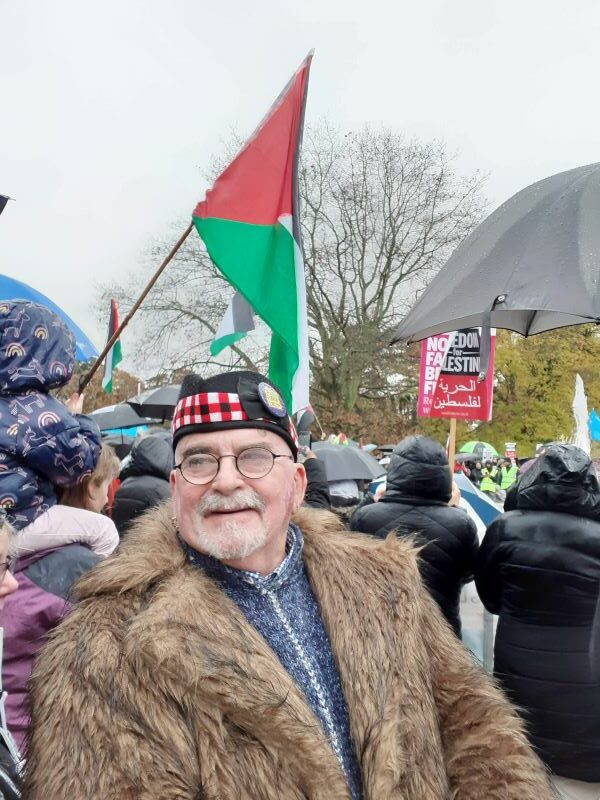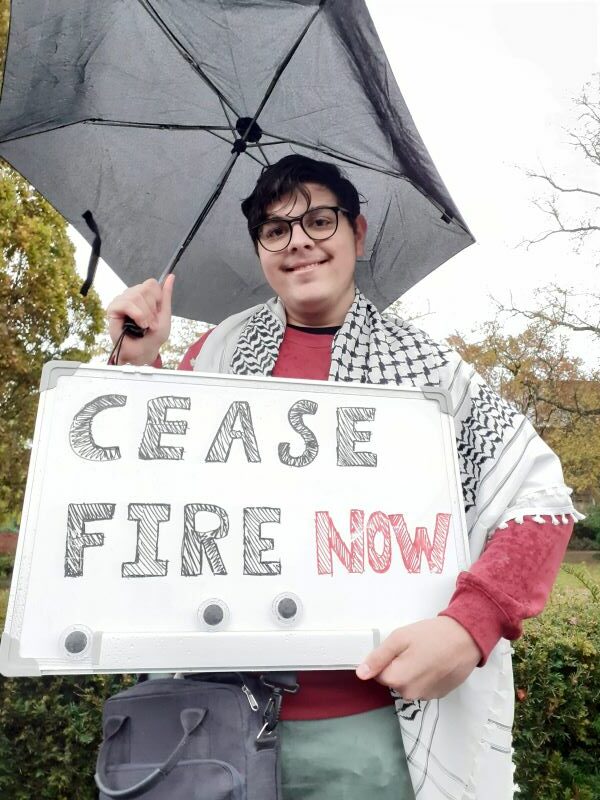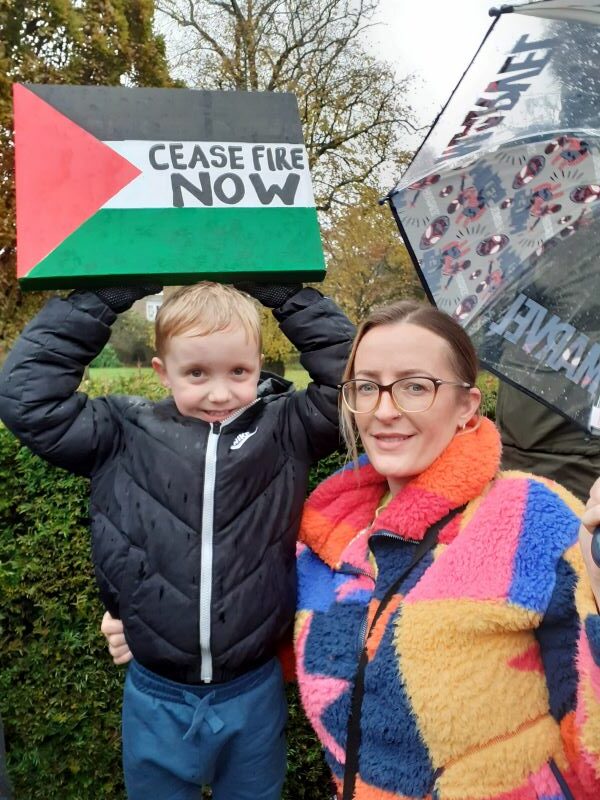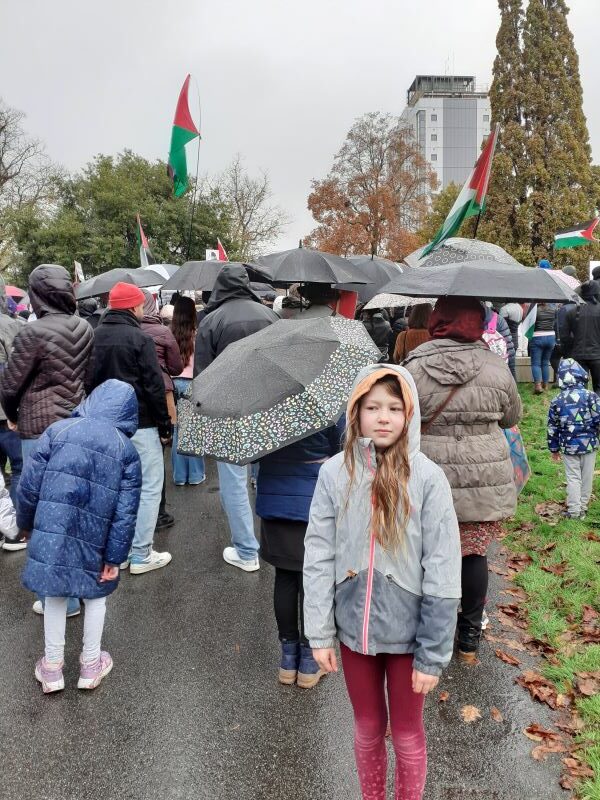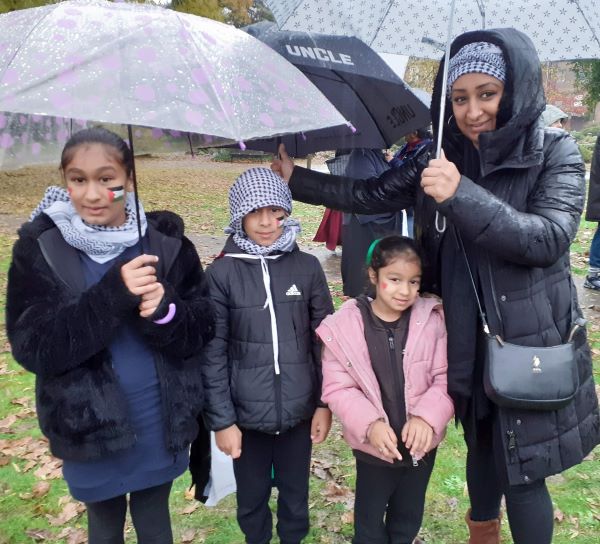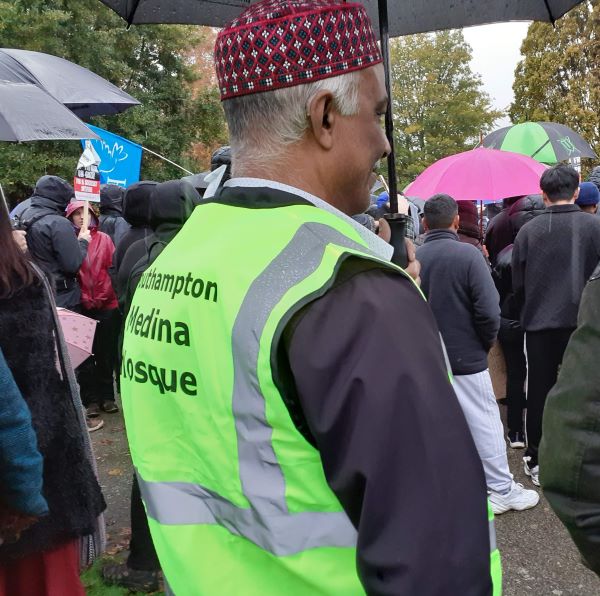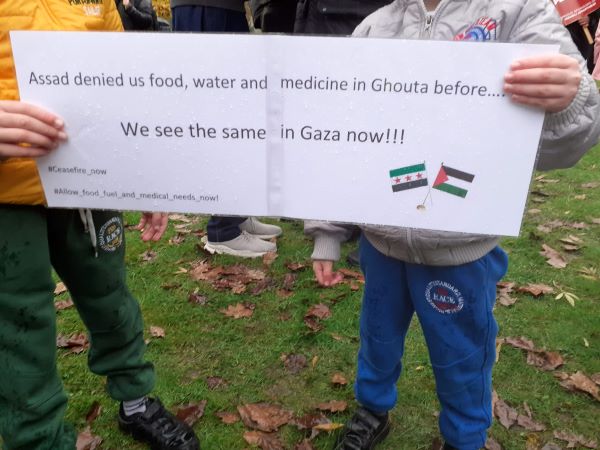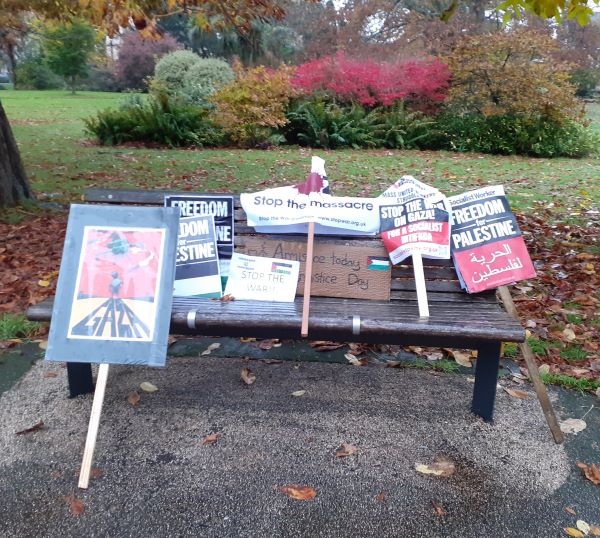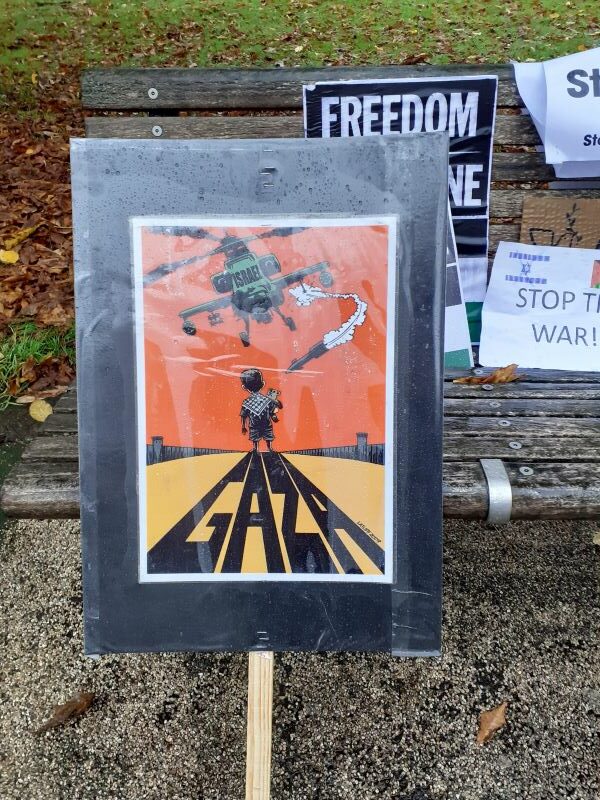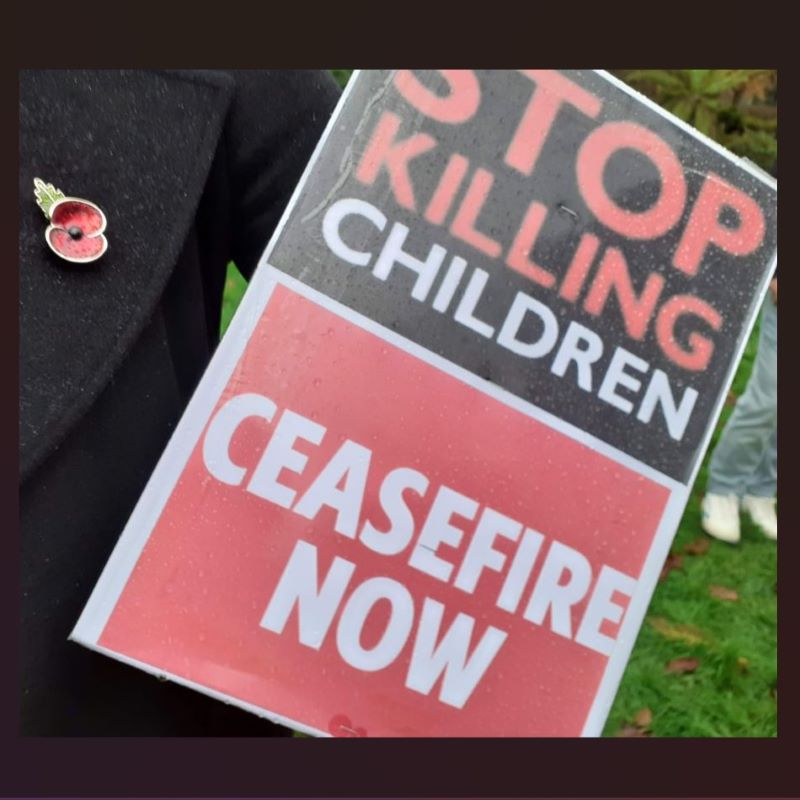By Sally Churchward. Additional reporting by Tom Williams.
Children and babies were in the hearts and on the lips and handmade signs of protesters at Sunday afternoon’s peace march and rally for Palestine in Southampton (November 12).
Children in Gaza trapped under rubble – missing, presumed dead. 4,600 dead children and babies over the last few weeks, maybe more. Babies with death certificates issued before their birth certificates. Dead babies in ICU. The almost incomprehensible and seemingly unending killing of children, children, children was what the 500 or so people who marched from the Bargate through Southampton before gathering at the Peace Fountain had come to mourn, it seemed, almost as much to protest against.
The handful of louts, spilling out of high street pubs, emboldened, perhaps, by beer and Braverman, to hurl often incomprehensible abuse at protesters appeared not to be too bothered by either the presence of children under rubble in Gaza or those holding their parents’ hands in Southampton as they shied away from the verbal onslaught.
There were a number of families in the solemn group gathered in the rain around the Peace Fountain in East Park. Many positioned themselves on the edge of the crowd, making their presence felt but where their little ones were not able to hear the harrowing details given in speeches of deaths of children their own age and families, not that different to their own, in Gaza.
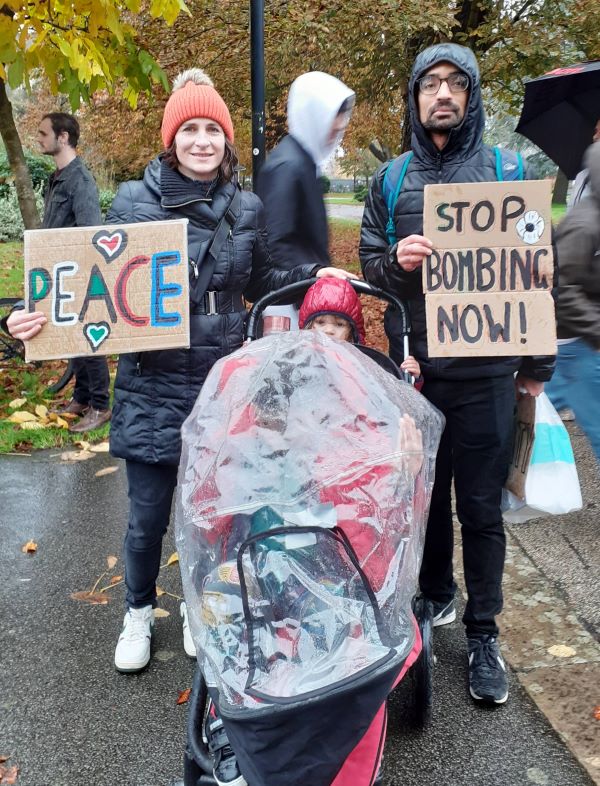
Those addressing the crowd included officers of the Muslim Council, Palestinian Solidarity Campaign, a Jewish member from Na’amod, a Palestinian Christian and a Muslim lawyer on the breaking of International law by Israel. Befittingly, it ended with two children, one five years old, one 7 years old, leading calls for a ceasefire.
While chants such as “free, free Palestine,” and “in our hundreds, in our millions, we are all Palestinians,” rang out across the march, the crowd was sombre as they gathered at the Peace Fountain. The two police officers, stationed at a distance, had no need to leave the warmth of their patrol car.
Amongst those gathered at the event, organised by the Muslim Council of Southampton and Palestine Solidarity Campaign Southampton, was a family from Syria, who came to the UK as refugees four years ago and said the scenes from Gaza felt chillingly familiar. Their two young children held a sign reading “Assad denied us food, water and medicine in Ghouta…We see the same in Gaza now!”. Their sign called for a ceasefire and to “allow food, fuel and medical needs now”.
Marika, who was at the protest with her family, said it was close to her heart, with family connections in the region – “it’s so inhumane and horrific, I want to do something,” she added.
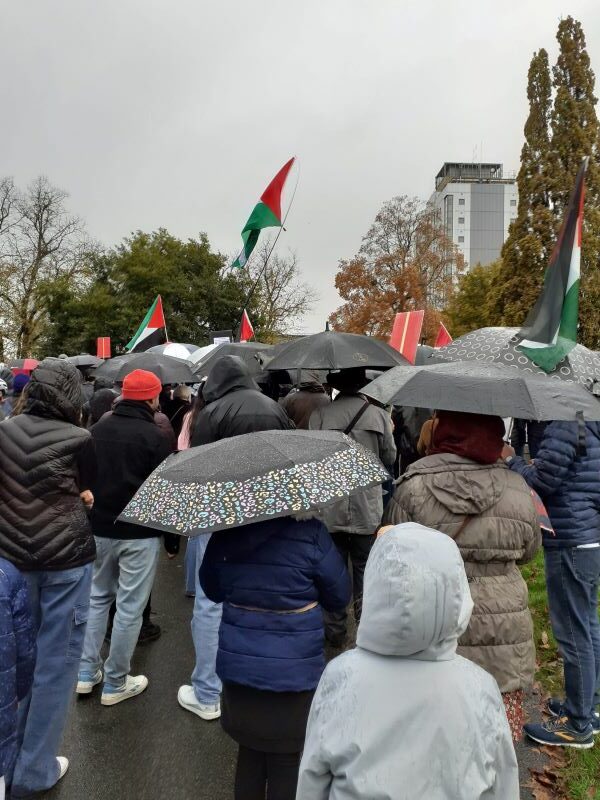
Elsewhere, a woman who asked not to be named, responded to criticisms that the protest should not have been held on Remembrance Sunday. She drew attention to her Commonwealth Poppy, explaining that both her grandfathers had served in the Second World War.
“To say Remembrance belongs only to one group is to disrespect all the others who served,” she said.
“People are dying on both sides now,” she added. “These are our brothers and sisters. It doesn’t matter what religion people are – it’s basic humanity: we are calling for a ceasefire.”
Another woman, wearing a crochet poppy, joined in to state the meaning of the word armistice. She held up a phone showing a dictionary definition: “an agreement made by opposing sides in a war to stop fighting for a certain time; a truce.”
Both had earlier been caught in a heated discussion with a bystander who was vociferously criticising the protest for taking place on Remembrance Sunday. To them, and others, the timing of the weekend’s marches when armistice and Remembrance were being marked, could hardly be more appropriate.
The most eventful aspect of the protest and vigil was the march from the Bargate to the Peace Fountain. It was then that protesters calling for a ceasefire were confronted by right-wingers and nationalists. One counter-protester attempted to tear up a pro-Palestinian sign (only to fail in embarrassing fashion because it was laminated). Another screamed “This is England – go home” at a British Asian pro-Palestinian marcher.
Arguments against the timing of the protest – and Saturday’s huge march in London – were echoed elsewhere – the idea that it was disrespectful to call for a ceasefire at a time when other war dead are being remembered. But for those marching through the streets, with a child in Gaza being killed every 10 minutes, time is critical and action did not bear delaying. Many present were on their second day of protesting, having joined the 800,000 people marching through London on Saturday (November 11).
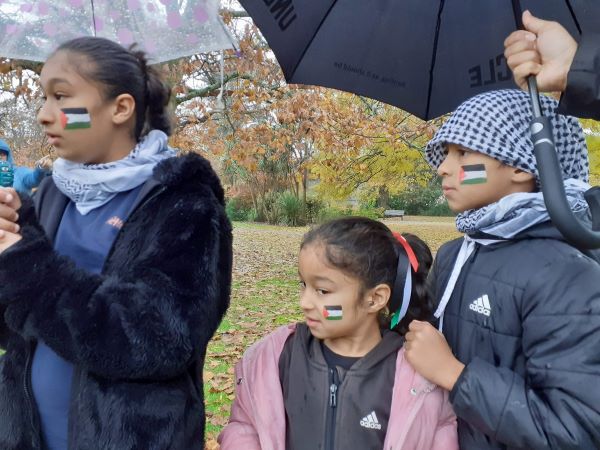
Glyn Oliver, of PSC Southampton said: “It is obvious that the majority of the population, 76% according to one survey, deplore what Israeli forces are committing in Gaza. PSC and the Muslim Council are determined to march until peace and justice are achieved for the Palestinians.”
And so the vigils, marches and protests continue in Southampton and across the country, and will do so until a ceasefire is declared. How many more mothers, fathers, grandparents, children, babies and other civilians in Gaza die under rubble depends on just how long it takes for that to be achieved.
- Palestine Solidarity Campaign is holding weekly vigils in Southampton outside the Civic Centre on Tuesdays, from 5.30 to 6.30pm. For more information, visit Palestine Solidarity Campaign Southampton’s Facebook page.
- PSC are urgently calling on people to email their MPs before the vote in Parliament on Wednesday 15 November on a ceasefire: palestinecampaign.eaction.online/ceasefire
- In Common is not for profit. We rely on donations from readers to keep the site running. Could you help to support us for as little as 25p a week? Please help us to carry on offering independent grass roots media. Visit: https://www.patreon.com/incommonsoton
